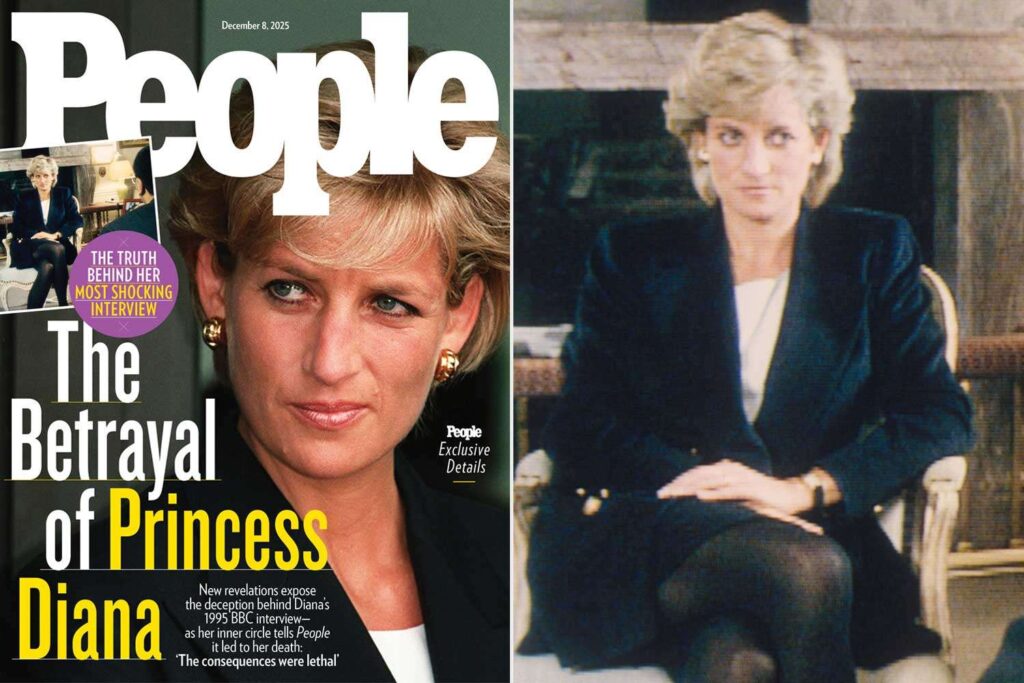NEED TO KNOW
Before the cameras captured the line that would echo through history, “There were three of us in this marriage,” Princess Diana stood in her private sitting room at Kensington Palace on Nov. 5, 1995, watching three men she had quietly ushered inside unpack camera equipment smuggled in cardboard boxes. She had sent her staff home. No makeup artist, no stylist, no standard TV crew. This interview, for the BBC investigative program Panorama, had to be in secret. The stakes, she believed, were that high — this was her chance to reclaim her voice and tell her story on her own terms.
Decades later it became clear that the interview was the product of an extraordinary deception. A 2021 independent inquiry led by U.K. senior judge Lord Dyson found that journalist Martin Bashir had used forged documents to manipulate Diana — a scheme BBC executives later tried to conceal. Prince William would go on to blame the interview for fueling his mother’s “fear, paranoia and isolation” and worsening her strained relationship with Prince Charles.
Investigative journalist Andy Webb has spent nearly 20 years unearthing the full truth — first sparking media coverage and ultimately prompting the Dyson inquiry, which he says overlooked the BBC’s 25-year cover-up. As recently as 2024, his Freedom of Information battle forced the release of thousands of additional BBC emails, though many remain heavily redacted.
Webb’s new book Dianarama: Deception, Entrapment, Cover-Up—The Betrayal of Princess Diana (out Nov. 25) lays bare for the first time the full scope of Bashir’s manipulation: luring Diana’s brother Charles Spencer — himself a victim of Bashir’s tactics — to gain access to the princess, presenting forged bank statements suggesting palace staff were spying on her and spreading false claims that Prince Charles wanted to have her killed and William’s watch was a spying device.
“Her life became untethered,” Webb tells PEOPLE in this week’s cover story. “It was frenzied between the interview and her death. There’s so much that’s new that I wanted to put down in this book — a first draft of history.”
Getty
Diana had reason to trust Bashir — he worked for one of the world’s most respected news organizations. Already wary of palace officials and shaken by breaches of her privacy — including “Squidgygate,” a secretly recorded phone call that went public in 1992—she felt watched and increasingly isolated.
Her former private secretary, Patrick Jephson, tells PEOPLE that “Bashir picked a very opportune moment” to show the faked bank statements to Spencer and convince him that people in Diana’s orbit — including Jephson and a senior aide to Prince Charles — were accepting money to spy on her.
“She was in a state of justified anxiety,” says Jephson. “It is not paranoia if you have reasonable grounds to believe that they are out to get you.”
Tim Graham/Getty
Adds close friend Rosa Monckton: “She was frail, and that made her susceptible.”
After Spencer, 61, arranged a meeting with Diana, Webb alleges, Bashir falsely told her that her sons’ nanny Tiggy Legge‑Bourke was having an affair with Charles, producing a forged document suggesting she had undergone an abortion paid for by the prince. Those claims were said to be the final catalyst that drove Diana to the interview.
By the time the interview arrived, just weeks after that first meeting, Bashir’s influence was firmly in place. Diana insisted on a stripped-down crew — Bashir, a producer and a cameraman — who slipped into the palace under the cover story of demonstrating a sound system.
Julian Parker/UK Press via Getty
Webb describes Diana and Bashir spending 90 minutes in the kitchen, reviewing the questions and rehearsing for what would become one of the most consequential broadcasts in royal history. When the interview aired on Nov. 20, 1995, it delivered bombshell after bombshell: Diana spoke openly about Charles’s relationship with Camilla Parker Bowles and her struggle with bulimia and confirmed her own affair with James Hewitt.
“It was a performance. The smoothness, the facility, the fluidity — at no point did Diana appear flustered,” Webb says.
The now-iconic image of her eyeliner-rimmed stare drew an estimated 200 million global viewers, none aware of the lies behind it.
The fallout was immediate. Within a month Queen Elizabeth ordered Charles and Diana to proceed with a divorce. Jephson resigned in January 1996, unaware of why the princess had turned sharply against him.
“It is chilling to rerun those events,” Jephson tells PEOPLE, “and feel that Diana was seeing me as the enemy within.”
Meanwhile, BBC executives knew something was wrong. In late 1995 a graphic designer told higher-ups that the bank statements were fake. When challenged, Bashir admitted to forgery but lied to managers, insisting he hadn’t shown them to anyone. Only when it became impossible to hide did he confess to showing the forgeries to Spencer. Instead of confronting the implications, the BBC launched a 1996 internal review, later condemned as “woefully ineffective.” It accepted Bashir’s shifting explanations, cleared him of wrongdoing and buried facts that wouldn’t emerge for decades.
“BBC bosses knew enough to warn Diana that she had been dealing with a fraudster,” says Webb.
Jeff Overs/BBC News & Current Affairs via Getty
“Her life would have followed a different path if she’d been warned,” Webb continues. “She might plausibly still be alive today — a grandmother at 64, enjoying her five grandchildren. The consequences were lethal.”
For their part, the outlet tells PEOPLE, “The BBC appointed Lord Dyson to investigate how Martin Bashir obtained the 1995 Panorama interview with Diana, Princess of Wales. The Dyson Report was published in 2021, the BBC accepted its findings in full and publicly apologized for its part in the report’s conclusions.”
It’s not enough for her brother. “High-ranking people in the BBC participated in securing this interview through appalling deception,” Spencer, who has supported Webb’s investigation, tells PEOPLE. “I am sure that this led directly to Diana being left vulnerable in Paris on the night she died.”
Tim Graham Photo Library/Getty
By the time of that final trip in August 1997, Diana had lost the guidance of her loyal aide. Distrusting palace officials, she had long declined official protection and relied instead on the security provided by then boyfriend Dodi Fayed’s team — a set-up that proved fatally insufficient. Without adequate counsel and protection, Diana was vulnerable in Paris, where she died at 36 in a high-speed crash caused by her driver’s intoxication and reckless driving, amid a chase by paparazzi.
“Because Diana had been tricked into distrusting every kind of official protection,” says Jephson, “she put herself in a position where she had to accept the protection of people who were not competent.”
Pegasus Books
Her sons feel the weight of that consequence, too. In 2021, Prince Harry, 41, stated, “Our mother lost her life because of this.”
Prince William, 43, who Webb says has a copy of his book, echoed that anguish: “What saddens me most is that if the BBC had properly investigated the complaints and concerns first raised in 1995, my mother would have known that she had been deceived. She was failed not just by a rogue reporter but by leaders at the BBC who looked the other way rather than asking the tough questions. These failings . . . not only let my mother down and my family down; they let the public down too.”
Mark Cuthbert/UK Press via Getty
The fight for the truth is ongoing. Webb points out the irony that the BBC operates under a royal charter while the future King’s trust in the broadcaster remains in question.
“William wants transparency, honesty and full disclosure,” he says.
Diana never learned the truth. She died unaware of Bashir’s lies and manipulations.
“She firmly believes that he was a truth teller, Webb continues. “Had Diana realized Bashir was a fraudster, everything would have fallen away.”

